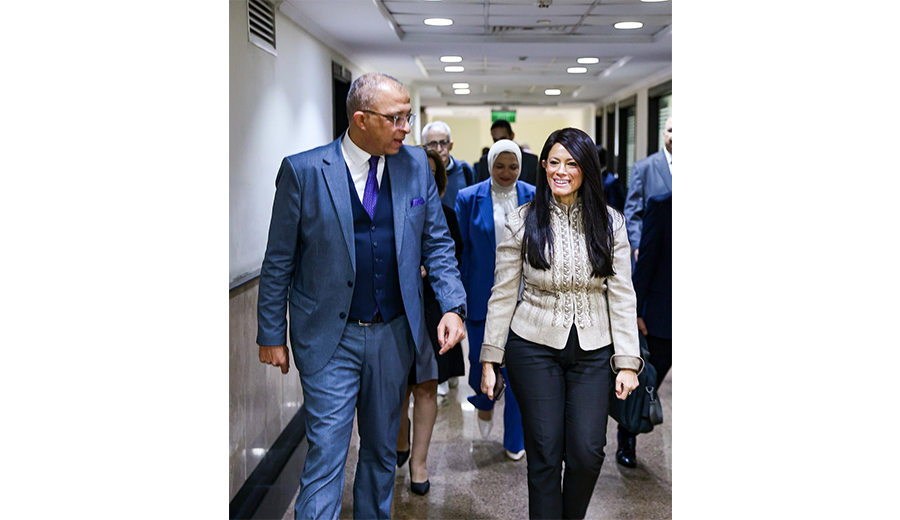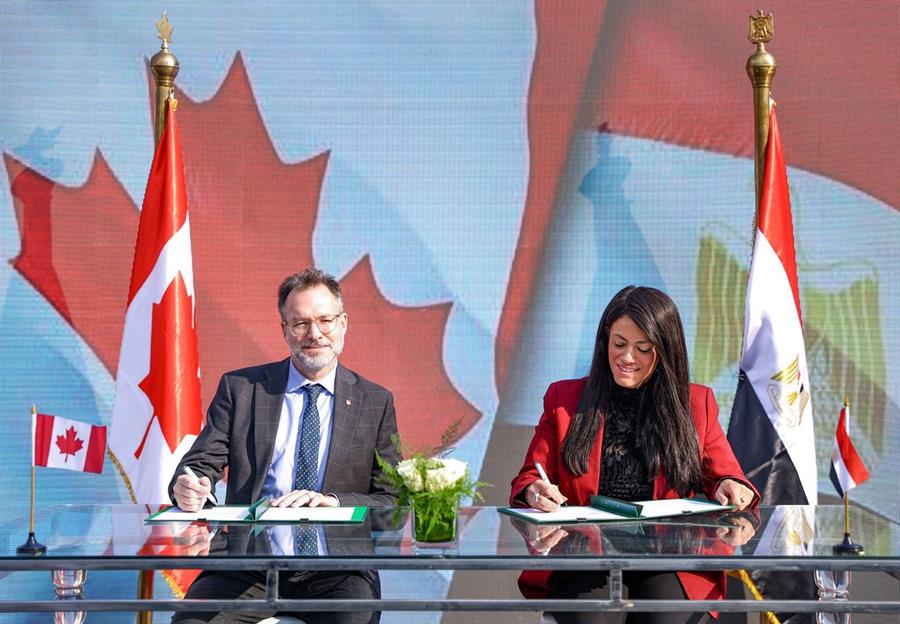Ministry of Planning reviews the total investments, targets, and indicators of the 2021/2022 plan for the sectors of pre-university and technical education, higher education, and scientific research

09 October 2021
The Ministry of Planning and Economic Development reviewed the total investments, targets, and indicators of the 2021/2022 plan in the sectors of pre-university and technical education, higher education, and scientific research.
Dr. Hala El-Said, Minister of Planning and Economic Development, explained that education is the main entrance to the development of human resources and societies to keep pace with the requirements of the transition to the knowledge economy and the promotion of international competitiveness in various aspects of life.El-Said stressed that all countries focus in their development plans on highlighting the role of education in building society and supporting its economic capabilities, and put it on their list of priorities when allocating resources and deciding options for programs and projects. “Believing in the importance of education in building the human being, and upgrading the society culturally, scientifically, and behaviorally, the successive development plans pay great attention to building the Egyptian character through upgrading the educational system, improving the quality of the educational system, and raising the efficiency, competence, and competitiveness of its outputs,” El-Said explained.El-Said explained that this is embodied in the steady improvement in Egypt's position in human development indicators and evidence, recording 707 degrees according to the Development Index issued by the United Nations Development Program for the year 2020.
Regarding the total investments of the education sector, Dr. Hala El-Said explained that they amounted to EGP 65.3 billion in the 2021/2022 plan, which includes EGP 56.4 billion in public investments, including EGP 54.2 billion in a government agency, in addition to EGP 8.9 billion in private investments.El-Said explained that the government apparatus’s investments amounted to about EGP 15 billion, of which 97.2% came from the public treasury, at a value of EGP 14.68 billion.Regarding the programs and projects for pre-university education and technical education, El-Said explained that in terms of the future vision for the development of education, several considerations were taken into account in the presentation of the education plan for the year 2021/2022, which included expanding the school’s absorptive capacity to accept all students of education age to achieve the principle of providing education for all, eliminating the phenomenon of students dropping out, especially in the basic education stage, the intensive trend towards developing technical education schools in all educational directorates.The plan also includes providing the basic technological infrastructure and devices necessary to maximize the technological component of the educational process, expanding technological education, expanding the establishment of STEM schools, and developing scientific exploratory centers to spread a culture of science and innovation.El-Said continued the talk about programs and projects for pre-university education and technical education, noting support for early childhood through the rehabilitation project for kindergarten schools, developing literacy programs, expanding the government program to provide education for all within the framework of the national literacy plan, qualifying teachers and training them on modern and advanced curricula methods.El-Said added that the government's estimated investments for higher education amount to about EGP 28.5 billion, adding that the investments of the scientific research plan are estimated at EGP 2.56 billion in the 2022/21 plan.About the objectives of higher education and scientific research, El-Said indicated that the plan for the year 2022/21 aims to establish 6 new technological universities in the cities of Salam, East Port Said, October 6, Borg El Arab, Assiut, Samanoud (Gharbia), Thebes (New Luxor), as well as establishing Hurghada University in the Red Sea, and South Sinai University in South Sinai, in addition to the completion of the establishment of 12 private universities affiliated with public universities.
The Ministry of Planning and Economic Development reviewed the objectives of the development plan for the year 2022/21 in the pre-university and technical education sector, which includes the achievement of several achievements represented in the rehabilitation and equipping of 3,000 schools in the education directorates, the establishment of (10) applied technical schools, and the establishment of 2,256 schools with 34,000 classrooms of which 93 schools are in the areas most in need of educational service with a total of 1156 classes, 600,000 tablets were purchased, bringing the total number to more than 2.5 million devices.The development plan also includes the completion of distance education platforms and teacher training, the establishment of 400 smart classrooms (smart spaces) out of the total plan to establish 24,000 classrooms, the completion of the equipment of 43 Egyptian-Japanese schools, and the establishment of eight new schools.The objectives of the plan included establishing and equipping 2 studios for broadcasting educational channels, completing the equipment of 19 STEM schools, in addition to establishing four new schools, rehabilitating 100 of the existing technical education schools to keep pace with the new competencies and curricula, with the start of the digital identity project to cover serving 24 million students over three years.
The Ministry of Planning also reviewed the goals of the 21/2022 plan about higher education, Azhar education, and scientific research, which includes completing the construction of the Egyptian-Japanese University, completing the equipment of the technological universities that have been operated (New Cairo / Beni Suef / Quesna, completing the construction and needs of the private universities that were opened) King Salman, His Majesty, and the new Alamein, the establishment of Senghor University in Borg El Arab, in addition to the rehabilitation of the French University, the establishment of (154) examination centers for university students and e-learning systems, the continuation of the university hospital automation program, and the completion of the construction of university hospitals, Kafr El-Sheikh, Tanta, Assiut , Zagazig, Sohag, Aswan, Beni Suef, and Damanhour.
The Ministry of Planning continued to review the objectives of the plan, including completing the modernization and development of the Oncology Institute, establishing a hospital for the Faculty of Dentistry at Ain Shams University, and completing a hospital for endemic diseases.
About Azhar education, the Ministry of Planning clarified that among the targeted achievements is the completion of the construction of Al-Azhar University, the technological development of Al-Azhar secondary institutes, the completion of the replacement, renewal, and expansion of 30 Azharite institutes, the completion of the digital transformation project for 88 colleges at Al-Azhar University, and the completion, equipping and replacement of Al-Azhar University hospitals ( Al-Hussein, Bab Al-Shaariya, Al-Zahra, Nasr City, Damietta), and Assiut University Hospital for Boys.
Regarding the objectives of scientific research, the Ministry of Planning explained that the allocated investments aim to finance several research programs and projects, which include the completion of the Science and Technology City for Electronics Research and Industry in Cairo, and the construction of a building along with the Remote Sensing Center in Nozha (Cairo Governorate).The allocated investments also aim to replace, renew and complete the construction of the headquarters of research institutes (research laboratories of Theodor Bilharz Institute / Institute of Eye Diseases), in addition to completing the implementation of the national plan for missions, establishing the Egyptian Center for Disease Control (CDC), as well as intensifying research related to the manufacture of pharmaceutical raw materials and the manufacture of Digital and interactive content locally within the framework of the research plan, which includes 198 research projects in various fields.The research programs and projects, according to the Ministry of Planning, included the development and elevation of the main laboratory building at the Institute of Metals Research at Tabbin in Cairo, the construction of the new radiometric building, the construction of the technology incubator building, the establishment of the African Space Agency headquarters, in addition to the establishment of a large data processing unit, and the start of the establishment of the Egyptian Genome Center to draw a reference genetic map for the Egyptian people, which includes identifying genetic influences in the effectiveness of drugs and treatment of various diseases, and the degree of response to the causes of various epidemics, especially heart diseases and predominant tumors.Within the framework of the priority structural reforms program for the Egyptian economy, the Ministry of Planning clarified that the directions concerned with developing scientific research include activating the Science, Technology, and Innovation Incentives Law, and activating the role of the Supreme Council for Science, Technology, and Innovation.
The aforementioned directions included the completion of satellite assembly and manufacturing centers in Space City, the completion of the Electronic Research Institute, the completion of the development of the information infrastructure of public universities, and the continued expansion of global scientific partnerships in research projects funded by international bodies, such as the European Union and international health institutes.









